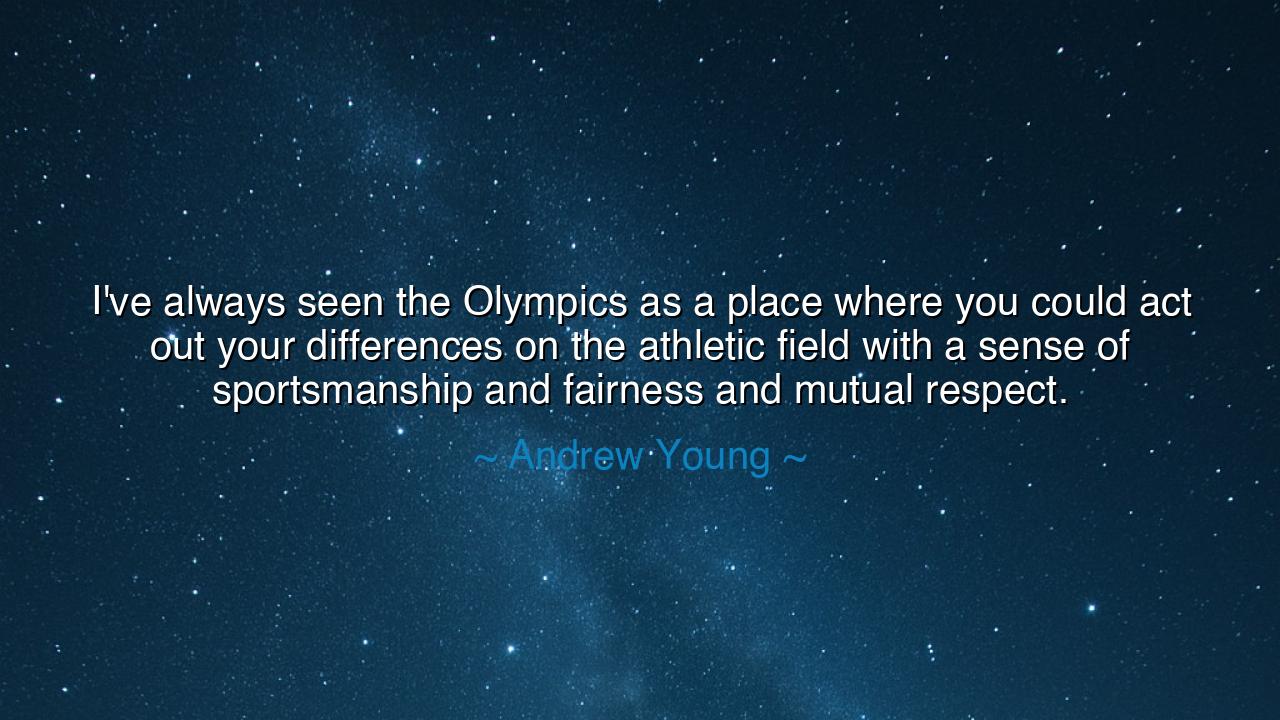
I've always seen the Olympics as a place where you could act out
I've always seen the Olympics as a place where you could act out your differences on the athletic field with a sense of sportsmanship and fairness and mutual respect.






In the wise words of Andrew Young, “I've always seen the Olympics as a place where you could act out your differences on the athletic field with a sense of sportsmanship and fairness and mutual respect,” we encounter a reflection on the true spirit of competition. Young, a respected civil rights leader and ambassador, underscores the Olympics as a unique arena where athletes from around the world gather not only to compete but to embody the ideals of fairness, mutual respect, and sportsmanship. In his view, the Olympics offer a space where differences—whether cultural, political, or personal—are set aside in favor of a universal bond formed through athletic excellence and a shared commitment to honor and respect.
The origin of this quote arises from Young’s deep belief in the power of sport to bridge divides between nations, races, and individuals. Throughout his life, Young worked tirelessly to promote peace, understanding, and equality, and he saw the Olympics as an embodiment of these values. The games are not just about winning, but about the celebration of human potential and the respect that comes from competing honorably. In a world fraught with political strife and division, the Olympics serve as a reminder that while differences may exist, we are all bound by the same human spirit. This vision of the Olympics is one of unity and mutual respect, where people come together not just as competitors, but as individuals sharing in a common experience.
In the ancient world, the Olympic Games held a similar significance. The first recorded Olympic Games were held in 776 BC in Olympia, Greece, as a tribute to the god Zeus. These games were not just athletic competitions but sacred rituals that brought together the Greek city-states in a spirit of unity and peace. The Olympic truce was established, calling for a cessation of hostilities during the games so that athletes could travel safely and engage in competition without the threat of war. The ancient Greeks recognized that the Olympics were a time to set aside differences and embrace the ideals of fairness and mutual respect. Just as Young envisioned, the games were a place where differences could be resolved on the field, through sportsmanship, rather than through violence or war.
Consider the story of Jesse Owens, the African American sprinter who defied Adolf Hitler’s notion of Aryan racial superiority by winning four gold medals at the 1936 Berlin Olympics. Owens’ victory was not just athletic; it was a profound statement of defiance against the racial prejudices of the time. Despite the oppressive political atmosphere and the racist ideology of Nazi Germany, Owens and his competitors showed that the true spirit of the Olympics transcends politics and racism. Owens’ success demonstrated the power of athletic excellence to unite people across boundaries and to challenge the hatred and division that existed in the world. His victories were not only about winning medals but about proclaiming the universality of human potential, as Young so eloquently describes.
In more recent times, the 2018 Winter Olympics in Pyeongchang, South Korea, offered another powerful example of the Olympics’ potential to bridge divides. The North Korean delegation marched alongside the South Koreans during the opening ceremony, a symbol of peace in the midst of years of political tension. This historic moment reminded the world of the Olympics’ power to transcend conflict, allowing nations and people with deep political divisions to engage with one another on the field of competition and mutual respect. Much like the ancient games, the modern Olympics continue to provide a space where differences can be expressed and resolved through sport, as Young envisions.
The lesson from Young’s reflection is clear: the Olympics remind us that, in the midst of our differences, we can find common ground. While the world may be divided by politics, race, or ideology, the field of athletics allows us to come together and celebrate the human spirit. The Olympics show us that competition can be about unity rather than division, about respect rather than enmity. It is a call for us to engage in our own lives with a spirit of fairness, honor, and mutual respect, recognizing that we are all connected by our shared humanity, regardless of our differences.
In our own lives, we must embrace the spirit of sportsmanship that the Olympics teach us. Just as athletes compete with respect for their opponents and the game, so too must we approach life with integrity, fairness, and a willingness to engage with others in a manner that upholds our shared dignity. Whether in our communities, workplaces, or families, we should seek to resolve our differences not through conflict, but through mutual respect and understanding. Just as the Olympics show us that the world can come together in the spirit of competition and peace, so too can we build a society rooted in these same values. Let us honor the legacy of the ancient games and the lessons of leaders like Andrew Young, and live our lives with a spirit of unity, sportsmanship, and respect.






AAdministratorAdministrator
Welcome, honored guests. Please leave a comment, we will respond soon